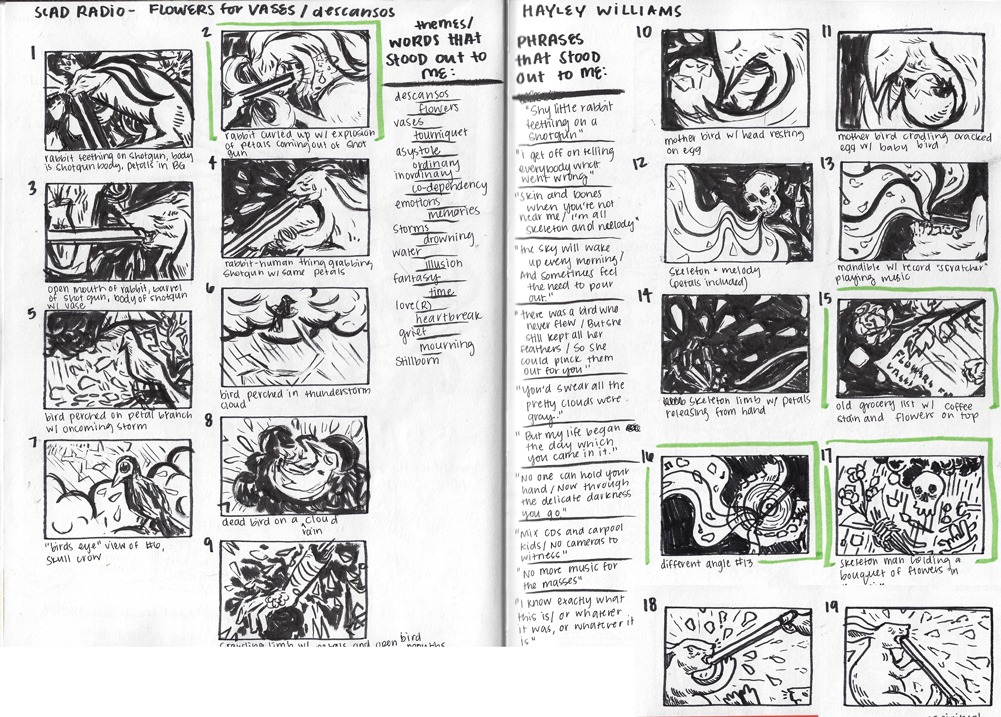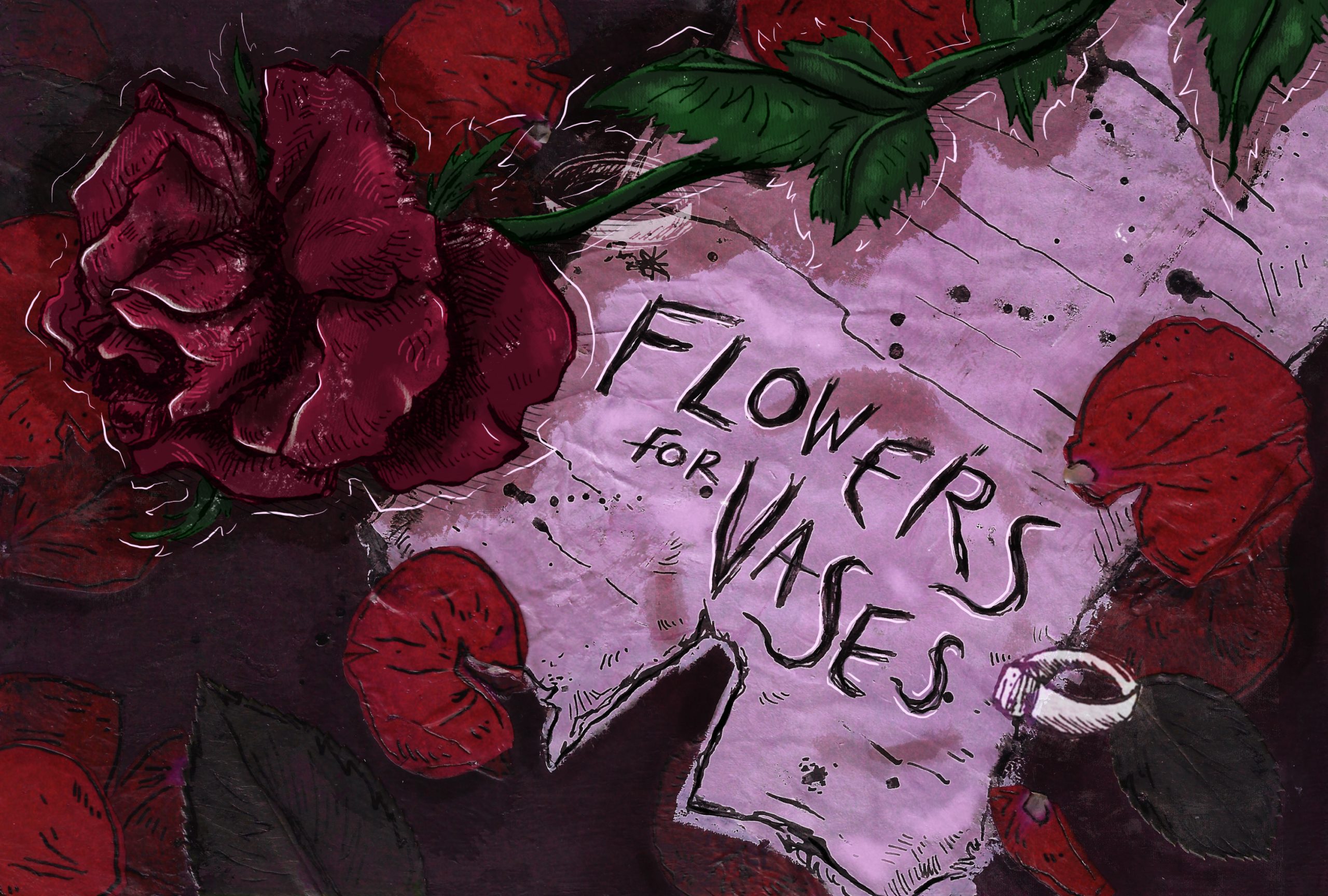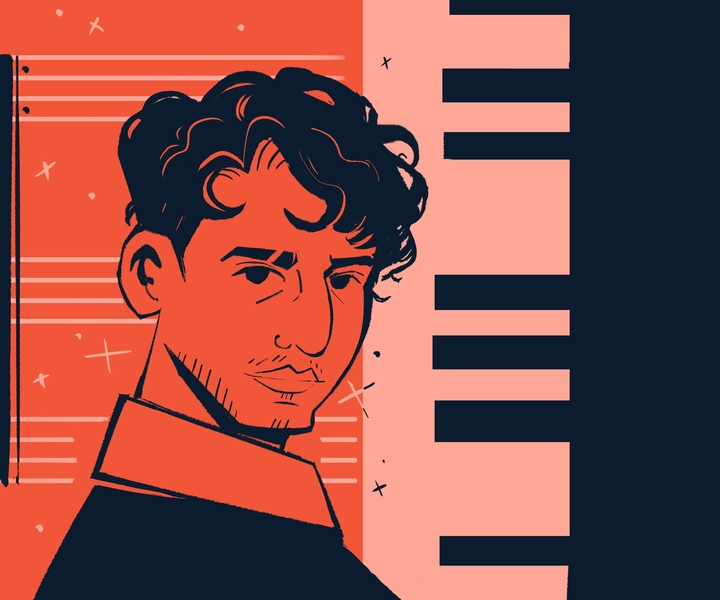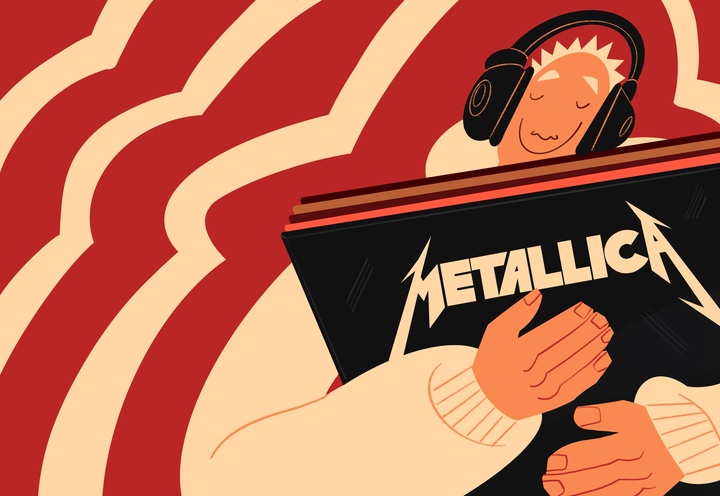Hayley Williams has done it again. Less than a year after her release of her first solo-album Petals for Armor, she has self-composed her new 42 minute album FLOWERS for VASES / descansos. It takes us along her road of healing, processing familial traumas, self-destructive patterns, and the joys of life and memories. The album is so beautifully constructed, laid out in such a way that the listener cycles through Hayley’s raw and erratic emotions as she was only coming to understand the simple-complexities of her life. It speaks in memories and visceral emotions, through different timelines within Hayley’s personal life and experiences with relationships with the people around her.
FLOWERS for VASES / descansos has a low-key beginning with the track “First Thing to Go.” It speaks of relationships and how many of us cope with leaving them. Even if the relationship was toxic, we begin to remember only the good traits that the person displayed, “Why do memories glow the way real moments don’t? My altar is full of our love’s delusion.” Those memories begin to fade, “First thing to go was the sound of his voice.” The song is a song of mourning, of remembrance in the worst way, of almost idolatry. The phrasing of “memories glowing” are reminiscent of the song “Rose-Colored Boy” off of Paramore’s last album released in 2017 where Williams sings, “Rose-colored boy… and oh, I’m so annoyed / ‘Cause I just killed off what was left of the optimist in me / Hearts were breaking, wars were raging on / And I have taken my glasses off.” Williams admitted in her Apple Music interview with Zane Lowe that she has been notorious for painting the reflection of people that sit in her conscious mind with rose-tinted glasses, only focusing on the good parts of her interactions with that person, which can make healing from separation between her and her relationships all the more hard to do.
And this separation is all or nothing, like the second song on the album, “My Limb,” which viscerally and elegantly describes the self-destructive preference to bleed out rather than separate from parts of herself or parts of other people that may be negatively affecting her. The sound and ambiance of “My Limb” is closest to a lot of the melodies in Petals for Armor. It’s closely identifiable with the song “Simmer”, with kinship in tonality that radiates internal conflict, angry that she has continuously “thrown away” entire parts of herself rather than fixing the parts that need attention. In the chorus she switches between “Don’t let go” and “Let go,” which is the one of the most difficult arguments she must wrestle with in her mind. Does she let go of the parts that are hurting her, or does she stay with harmful habits that are familiar? That’s a question that many of us must ask ourselves, and we must be honest with ourselves, which is the hardest part.
“Trigger” opens with the powerful lines, “I get off on telling everybody what went wrong / It makes me feel like the pain had a purpose / Keeps me believing that maybe it’s worth it / Truth is all I really want is / Somebody who wants me.” Many of the tracks on the album are still exploring the emotions that After Laughter and Petals for Armor were only beginning to scratch the surface of. It has still only been four years since her divorce, and with divorce being a cyclic theme in her life with her parents, there’s more than just the surface trauma for her to lyrically explore.
Hayley’s voice harmonizes in “Good Grief,” radiating such emotion with the beautiful tone of a loud-lullaby. “Haven’t eaten in 3 weeks / Skin and bones when you’re not near me / I’m all skeleton and melody / There’s no such thing as good grief / Sleep with you in a sex dream.” When going through the stress of her divorce, Hayley’s weight dropped to a mere 91lbs. Not only was she barely eating from symptoms of anxiety and depression, and using alcohol to cope with those symptoms. Her panic attacks became so bad that she would pass out, causing her to be hospitalized. “Pretty sure you don’t miss the way / I put all my demons on display,” she serenades; it’s not clear who she’s speaking to in these lines, though it could easily be her ex or other people that are close in her life.
Since her After Laughter tour, Williams has been in talk therapy to learn how to manage her symptoms and struggles with mental illness. She speaks about her struggles openly, and the objective way she’s able to describe these feelings in this way on the album makes this apparent. “Good Grief” displays the emotions of the moments in her separation with her ex, “Took two months to pack up your things / But I left a box at your parents’ house / Don’t know whether to feel sad or proud.” There isn’t any “such thing as good grief.” The body still feels the effect of the grief, whether or not if it’s for a good reason. How could grief ever be good? When emotional pain becomes physical manifestations, it becomes very clear to the public eye that you are suffering.
Though, not every song on the album is so somber. “Over Those Hills” is a melodic description of a fantasy land. “Thought I’d had enough / But the hurt is half the fun,” Hayley Williams belts followed by an amazing guitar riff. Love is such an unpredictable feeling, and pain comes along with the thrill of being in love. Being lucky enough for heartbreak, as Lowe put it in his podcast with Williams, is such a thrill, but pain is something that we continue to process as we move through our lives, which is explored in many of the other tracks on the album. “Over Those Hills” is a more positive reflection on love, fantasy, and relationships that do realistically come with their own hardships.
The tone shifts to a more upbeat guitar riff in “Wait On.” Calling back to “Fake Happy” lyrically in After Laughter, but with an upbeat acoustic sound as opposed to synth-pop. “The sky will wake up every morning / And sometimes feel the need to pour out / All the feeling it’s been holding / But either way / It never comes down / It knows it’s place / And knows a way around the clouds / and their design.” Williams’ exploration of co-dependency continues, describing the feeling of not being able to move on with your life without the other person, when it is merely self-sabotage. But further in the track, she discovers some healthy boundaries. Her eloquently written metaphor of the sky being a person, the “pour[ing] out” being emotions, and then the choice of whether or not to rain. Friends and support mechanisms are always helpful, but there also has to be the boundary of whether or not it’s the right time to express or dump emotions onto the other person. Friends know their ways around the clouds, but over-honesty and over-sharing can drain the opposite party. But we still share memories to help each other cope when it’s appropriate. Experiences are different, but we relate and continue to pick up the pieces with the help of honest relationships.

Connections with her friends strengthen with the elegant harmonies of “Find Me Here” with a small Hayley chorus singing into your ears. It’s hard to admit that sometimes you cannot help the people that are closest to you; always being there, but not able to control and curb their struggle even when you want to protect them from the world. Hayley sings, “No one can hold you hand / Now through the delicate darkness you go / If I trespass one step / It all just disappears, clock starts over / As long as I am loving you, you’ll never be alone… But this is one trip you’re gonna have to take alone / When you come back, you’ll find me here where I belong.” The harmonies in this particular track helps with the content of the lyrics— an army against darkness, a support mechanism.
“HYD”’s introduction reminds the listener that this is being recorded at her house—the sound of a plane flying overhead is audible in the recording. This song feels like it’s living in a memory, being reminded of a person in her life, presumably her mother, when she was in a dark place in the midst of her own divorce. “In a million years, never thought I’d see the day you’d choose your fear over me / ‘Cause many storms have come and if not for you / I’d have been struck down, disappeared at sea / I know it’s hard for you to take a compliment / But my life began the day which you came in it.” I saw the last line is the reverse of a mother “bringing a child into this world,” and rather giving commemoration to the moment that life begins. This parallels with the second start of her life in Nashville in 7th grade that was described in “Inordinary.” Mothers are known to save us from the darkest of places, even when sometimes they cannot navigate their own woes and personal struggles— it’s the plight of a mother.
Until “Inordinary,” the content in the album was primarily metaphorical, describing emotions as visuals, memories spoken in tongues with visceral imagery. “Inordinary” is storytelling and more grounded in specific imagery; Williams tells the story of when her life really began when her mom waited for her in the car when she got home from school, and literally ran away with her to Nashville—the perfect plan picked by her mom for her budding music interest and future career. Her life before 7th grade in Mississippi, she “was nobody’s,” which was shifted when her mother changed their entire lives in this run-away move up “north.” “We left home when we were teens / I grew bored of simple things / You gave me another chance / A renegade, holding your hand / I was somebody’s.”
This song is a “thank you” to her mother for changing the entire trajectory of her life, which would have never happened without that decision to uproot their lives. Her mother and her were renegades together— “Life began in 7th grade / When me and momma got away / Came home from school one afternoon / She was waiting in the car for me / She said “Don’t worry.” / Started over Tennessee / Rent was cheap and we were free.” Hayley has always referenced this change in her life to be pivotal, but this is the first song that I’ve heard that really delves into the gratitude and admiration Williams has to her mother for that point in their life. There was a change of space, the change of the ordinary. She was inordinary where they were, and Nashville made the life she knows now. “I wish that feeling stuck around / There’s a beauty to be found.” She reminisces for the pure emotions in childhood, and wishes that the same feeling would stick around in her, now two decades down the line.
“Descansos,” the word for the markings placed on the side of the road in memoriam, is the second title of the album. Though this song is only the interlude to the finale, the instrumental includes snippets of memories, life lost and life found. You can hear Hayley’s fingers slide against the guitar strings, baby’s crying, people laughing— it sounds like a compilation of home-family videos. This album has so deeply gone into the depths of familial traumas and explored memories as far back as childhood for Hayley. It’s a mourning and a rejoice of memories. The use of the word descansos for the second title is an in-memoriam to these memories that have affected Hayley’s perspective on love, relationships and life interactions. Putting flowers in positive memory, and trying to let go of the past, to let go of limbs, that has been holding her back.
“Just a Lover” starts “far away,” similar to “HYD” and “Descansos.” The lyrics introduce the incatricies of love: “Love is not a friend, it’s not a brother / Love is not a Wendy-Moira-mother / Love has turned me into many others, now I guess I’m just / Just a Lover.” Using such an iconic image of Wendy Moira’s mother from Peter Pan, known to be the beautiful, kind and understanding motherly figure communicates the fantasy land that the idolization of love creates. In the long run, we can compare love to different relationships with significant others, to characters, to stories, but in the long run, we’re all just lovers.
Love is not concrete. Nothing will ever perfectly describe love. In the same verse, Hayley also describes her morphing into “others,” which can be easy to do when you’re trying to change yourself for others. She follows these comparisons with select memories from her childhood, “Once upon a time when we were school kids / Mix CDs and carpool kids / No little cameras to witness / Really hope we don’t wreck this / When you coming over?” The typical childhood experience is filled with love in its purest form, adult upsets not being able to taint that emotion yet. We are just beginning to build relationships, show our love to other kids by asking them to come over, carpooling with our new friends, and later making them mix CDs (or now playlists) that remind us of them.
“Space and time, waking hours before I open my eyes / In the morning, I feel my heart crack open, one last chorus / I’ll be singing into empty glasses / No more music for the masses / One more hour, one more ugly, stillborn cry / I know exactly what this is / Or whatever it was, or whatever it is.” this quote needs some introduction–awkward for it to open without being attached to anything FLOWERS for VASES / descansos is a catalog of processing and trauma. Hayley confronts her alcoholism, singing her heart out for one last chorus with completely open lyrics. “No more music for the masses,” like was done for Paramore with uber sad lyrics combined with pop tunes. She shares her life lyrically now, and this song appears to have the realization that those people will always be there to hear her pour her heart out during her shows for “one more hour, one more ugly, stillborn cry.” The masses will always be there to listen, whether she wants them to or not.
Overall, the album is not only lyrically genius, but there is no other way that it could have been structured in order to live-communicate the emotions that Hayley has been processing during this year alone in a pandemic. In her words, Petals for Armor was surface level trauma; Hayley was ready to tour again, sing her songs to the fans, and hide behind the wall of the crowd. The pandemic gave her the opportunity to create, by herself, and process and learn about her past and her current ties to those memories. Hayley knows her privilege, and she’s been able to get help and go to therapy over our collective quarantine-stint; we had the privilege to listen to eloquent descriptions of her emotions, and finally got to see Hayley relearn to “play” with music once again.



